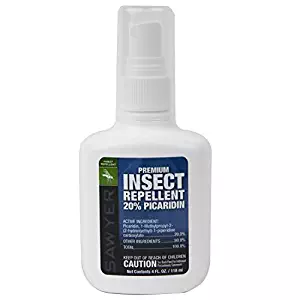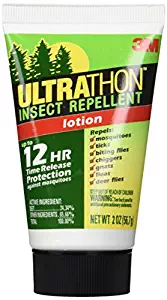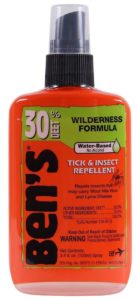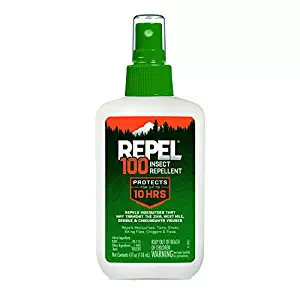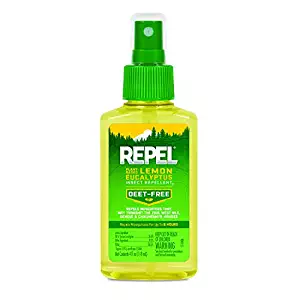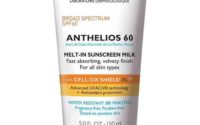Strongest Mosquito and Insect Repellents on the Market
We have found the strongest and most effective mosquito and insect repellents for the most extreme conditions. If you find yourself in an insect-infested area and you have a bug spray that doesn’t work, you could be putting yourself at risk for diseases like West Nile Virus, Lyme Disease, and Rocky Mountain Spotted Fever. Getting the perfect a bug spray that works for you without causing skin irritation or other side effects can be a trial and error process. To help you find the right solution, we have rounded up the strongest and best products based on professional testing reports, as well as consumer and expert reviews.
Sawyer Products Premium with 20% Picaridin
Sawyer Premium Insect Repellent uses picaridin, which is the active ingredient that Europeans prefer over DEET. Picaridin has a few advantages over DEET including being odorless, non-irritating to skin and it won’t melt plastic so your gear won’t get destroyed. If you are considering getting a mosquito spray with picaridin, you need to ensure that you are getting one that contains 20% concentration. Picaridin has been widely used as a repellent in Australia and Europe but has only been available in the United States since 2005 when the EPA approved it. Sawyer Premium is safe to use on the whole family, but don’t use this product on babies under two months, and is available in a spray or a lotion.
User’s reviews are excellent for Sawyer Products Premium. Reviewers note that it has a mild citrus scent and dries quickly, so you don’t feel a greasy residue. It also doesn’t damage gear or clothing. There are a few reviewers who mention that it can cause skin irritation on some users.
Check the price on Amazon
3M Ultrathon Insect Repellent Lotion
The main active ingredient in 3M Ultrathon Insect Repellent Lotion is DEET, and it can last up to 12 hours. It is the bug spray you should get if you are going to a location where there is a high density of biting insects (the Everglades, Alaska, Central American Jungles, etc.).
Since this repellent was developed for the military to help give the troops the best protection in the harshest conditions, it will provide long-lasting, time released protection against all kinds of pests including mosquitoes, ticks, biting flies, chiggers, gnats, fleas, and deer flies.
3M Ultrathon uses time controlled release of DEET so that it can last longer than some of its competitors. It is also consistently rated as a top product by independent testing labs.
There are some user complaints that the smell of the product is unpleasant, although other reviews counter that claim saying there is virtually no odor or only a very faint chemical smell. Users also like that the lotion feels light, so it is almost as though you aren’t wearing a repellent and a little goes a long way. It is also highly recommended for various countries where mosquitoes pose a threat, as is easy to apply, the smell is mild, and the size of the tube is small enough to carry with you when traveling easily.
3M Ultrathon contains 34.34% DEET in a polymer base, which is on the high-end of the recommended level, but it uses the controlled-release technology, so it is slower to evaporate than other bug sprays. It will last up to 12 hours and doesn’t penetrate the skin quickly; instead, it stays on the skin’s surface. It is also sweat and waterproof.
The American Academy of Pediatrics has advised against using sprays with DEET concentrations higher than 30% on children, so this would not be something that you use on kids.
Check the price on Amazon
Ben’s 30% Deet Insect Spray
Another top-rated product is Ben’s 30% Deet Insect Spray. Its main active ingredient is 30% DEET, so it works on most insects that may carry West Nile virus, Lyme disease, malaria, and other infectious diseases. It is a water-based formula so it shouldn’t evaporate from the skin like an alcohol-based formula may do. It is an excellent option for backpacking, camping, and hiking, although the active duration time is only up to 6 hours.
Check the price on Amazon
Repel 100 Insect Repellent
If you are looking for a high concentration of DEET, look no further than Repel 100 Insect Repellent. It has a concentration of 98% and can last for up to 10 hours. It repels mosquitoes, ticks, gnats, biting flies, chiggers and fleas. Some people find that the higher concentrations aren’t necessarily better and don’t work as well when mixed with sweat or water. Repel also sell a very popular 40% DEET spray called Repel Sportsmen Max that is also very effective.
Check the price on Amazon
Repel Lemon Eucalyptus Natural Insect Repellent
Repel Lemon Eucalyptus Natural Insect Repellent has emerged as one of the best options for bug repellent that uses a natural active ingredient. Not only does it use the botanical ingredient oil of lemon eucalyptus, giving consumers who are worried about exposure to synthetic chemicals a valid alternative, it also comes out on top of many of the best bug sprays lists by experts.
Lemon Eucalyptus is a natural plant-based oil that repels mosquitoes and deer ticks for up to 6 hours. It also repels flies, no-see-ums, and gnats. Oil of lemon eucalyptus is the only plant-based ingredient recommended by the Centers for Disease Control and Prevention (CDC) in bug sprays. User reviews for this product are overwhelmingly positive. Users love that it is a non-greasy formula, doesn’t damage gear, and is very effective at repelling bugs. There are a few negative comments about the scent of the product, including one comment from a user saying that you will smell like a lemon and menthol cough drop if you use it, while other users love the scent. One other downside is that it isn’t water-resistant, so you must reapply if you are sweating heavily or get wet.
Do not use this product on children younger than 3 years old, as it can irritate their lungs and it can cause possible allergens.
Check the price on Amazon
What is the latest research saying about DEET and other active ingredients?
The Centers for Disease Control and Prevention recommends using repellents that use the active ingredients picaridin, DEET, or oil of lemon eucalyptus to protect against mosquitoes and ticks.
Generally, the consensus in North America has been that DEET will give you the most protection against bug bites, although a lot of consumers are wary of using it and have been looking for effective alternatives.
Picaridin (also known as Icaridin) is a synthetic version of piperine, the chemical that gives black pepper its spiciness. It is what Europeans have been using for many years to ward off bugs, but was only approved by the EPA to use the United States in 1999.
Picaridin has been reported to be as effective but without the irritation and risk of damaging gear that comes with DEET products. Products with Picaridin is safe for use on babies as young as two months old.
Lemon eucalyptus oil (also known as p-menthane-3,8-diol or PMD) is one of the natural oils that come from the gum eucalyptus plant. It has been used in China for years as a bug spray and was registered in 2000 by the EPA as a ‘biopesticide repellent,’ which means that it comes from natural materials. Under laboratory conditions, it has shown to be superior to DEET, and when tested in the field on humans it has a comparable result. The only adverse effect of PMD appears to be eye irritation.
Despite the positive test results of picaridin and lemon eucalyptus oil as repellents, DEET is still the most popular active ingredient chosen by consumers. It was developed in 1946 by the U.S Army became commercially available in 1957. However, despite 40 years of testing, it just can’t seem to shake its bad reputation. There were a few reported cases of children exposed to DEET suffering seizures in the 1980s, but that has (for the most part) been debunked. The EPA confirmed its safety after further testing and review in 1998. There has been no clear link between it and seizures in recent years, and studies in the last decade have found it to be safe and effective to use, as long as it is in a concentration between 15 and 30 percent. The American Academy of Pediatrics says that insect spray containing DEET are safe for children as young as two months.
What you need to know:
- Use bug sprays whenever you are planning outdoor activities for extended periods like camping and hiking, especially around freshwater ponds and lakes and areas where there may be stagnant water.
- Use them sparingly and only for the time you need it. Wash it off when you are back inside.
- Choose your repellent on the type of bug you need to ward off.
- Use it to cover any exposed skin on the entire body, including the head and face. Don’t use it under clothing. When applying it to your face, make sure to avoid your eyes and mouth.
- Some users may find that they have a sensitivity to specific products and will need to use a trial and error approach to getting the right product.
- If you are sweating or bathing, you will have to reapply afterward.
- Put on sunscreen before bug spray.
- Don’t buy a combination repellent/sunscreen product, because sunscreen usually needs to be reapplied more often than bug spray.
- Don’t apply it near food, and make sure to wash hands after application and before eating or drinking.
Before Buying:
Since there are a lot of different products that come in all sorts of forms, here are a few things to keep in mind before making your purchase.
Try to find a product that has long-lasting protection. Most people don’t like having to reapply bug spray constantly. If you are planning on being outside for many hours, pay attention to how long the product claims to last. Also, look for a product with a slow-release formula.
For most users, the scent is an essential factor when choosing a formula. A lot of the top products have powerful fragrances so, if you can, test them out before purchasing
Decide whether to get lotion, wipe or a spray. The most convenient and most popular is the spray bottle, but if you aren’t careful you can end up inhaling the product, or it is easy to miss a spot, and any exposed skin can lead to a bite. Lotions are generally considered easier to control where the product is going, although you can’t use it on your clothes as you do with a spray.
If you are shopping for kids, the active ingredients DEET and picaridin are considered safe for kids over two months old, while oil of lemon eucalyptus is safe for use on children older than three years.
Mistakes people make when using bug spray
- Not Using Enough – An easy mistake to make when it comes to bug spray is not applying it thoroughly enough. You need to apply it to all of your exposed body parts. If you miss a spot, a bug will easily be able to find any unprotected areas and bite you.
- Not reading the instructions – It seems simple enough, but surprisingly most people don’t look at the instructions and either use too much of a product or not enough. It should be applied in a thin layer and you should never apply it over cuts, wounds, or inflamed skin. Also, pay attention to the length of protection time.
- Choosing the wrong type of product for the pest you are trying to repel – This is another case where you need to read the label and make sure the product you are buying repels the right insects.
- Not wearing it when you should – It is best to err on the safe side and apply bug spray anytime you are outside at dawn or dusk or if you go into tall grass or a forest. There are so many disease-carrying bugs that it is best to use repellent when there is any chance of getting bites.
- Avoiding DEET – There are a lot of misconceptions when it comes to DEET based products. It has been used commercially for almost 60 years and has been studied more extensively than any other repellent ingredient. Some estimates say that there have been over eight billion applications of DEET worldwide. In that time, there have been only 21 cases recorded in medical journals where links occur with the development of neurological toxicity. Interestingly, of the 21 cases, six were due to intentionally ingesting the product. 12 of the 21 cases resolved themselves without any further effects. There is also the repeated idea that it causes seizures in children, which is actually without any scientific foundation. This idea stems from a few scattered cases of children who had been using DEET based products suffering seizures. After the cases were reported, there was extensive follow-up with the patients who had the seizures, and it was found that either pre-existing neurological conditions or not using the product as directed was the cause of the seizures. If you use DEET in very high concentrations (more than 30%), it may cause numb or burning lips, nausea, headaches, and rashes, although hardly any of the products that dominate the market use over 30 %.
Sunscreen and repellent used together:
There are a few products on the market that contain both sunscreens and insect repellents; you should avoid these because sunscreen needs to be reapplied more frequently than bug spray. Another problem is that repellent in combination products tends to get absorbed into the skin more than in repellent-only products.
Experts recommend that you apply sunscreen before the repellent, making sure that the sunscreen has soaked in thoroughly before applying the bug spray. One study has shown that if you are using a DEET based spray, it may reduce the effectiveness of the sunscreen, so you may need to reapply the sunscreen more frequently.
What is worse for you bug bites or repellents?
Experts in the field agree that the risk of contracting debilitating and sometimes deadly diseases from mosquitoes and ticks far outweigh the risk that comes from exposing yourself to the chemicals in repellents. In recent years new and safer products that contain milder, chemically synthesized compounds that are similar to, or come from natural ingredients are proving to be equally as good at repelling insects as DEET.
Despite its reputation, DEET is still one of the best options for warding off bugs; especially if you are looking for protection when in a heavily insect-infested area. When the EPA reviewed all data about DEET in 1989, they determined that it was safe to use as directed, but can have toxic reactions when not used as directed and it should not be used on babies less than two months old.
The Bottom Line
As recent news stories about the devastating effects of Lyme Disease or the West Nile Virus have shown, a small bite can do a lot of damage to a person’s health. Since the threat of being infected by a virus carrying bug is a reality, it is well worth finding and correctly using a powerful insect spray that can stop these pests. Consumers these days are lucky to have a good range of practical and safe choices to prevent being bitten. Testing of DEET has shown it to be a powerful and safe ingredient for most people to use, although if you aren’t convinced and need an alternative, you have them in products that contain either Picaridin or Oil of Lemon Eucalyptus. Whatever product you choose, make sure you follow the directions to ensure that you are getting the best out of what you are using.
- The Safest Plastic-Free Electric Kettles - 14 May 2020
- 8 Eyelash Serums That Really Work - 30 January 2020
- The Best Shapewear for Tummy Control - 29 January 2020

